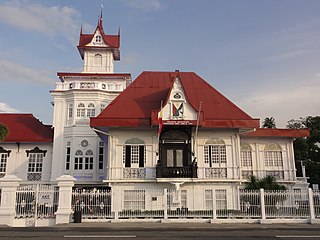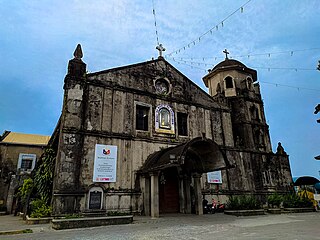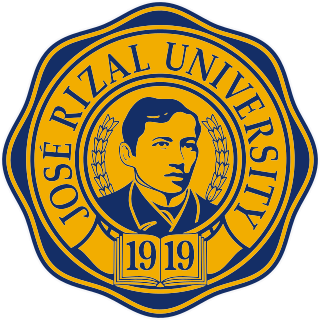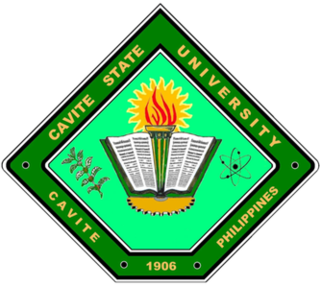
Cavite, officially the Province of Cavite, is a province in the Philippines located in the Calabarzon region in Luzon. Located on the southern shores of Manila Bay and southwest of Manila, it is one of the most industrialized and fastest-growing provinces in the Philippines. As of 2020, it has a population of 4,344,829, making it the most populated province in the country if the independent cities of Cebu are excluded from Cebu's population figure.

Antipolo, officially the City of Antipolo, is a 1st class component city and capital of the province of Rizal, Philippines. According to the 2020 census, it has a population of 887,399 people. It is the most populous city in the Calabarzon region, and the seventh most-populous city in the Philippines. It is also the most populated city under the component city status.

Pacific Union College (PUC) is a private Seventh-day Adventist liberal arts college in Angwin, California. It is the only four-year college in Napa County, and the twelfth oldest institution of higher education in California. As a coeducational residential college with an almost exclusively undergraduate student body, most of those who attend the college are four-year students living on campus.

Biñan, officially the City of Biñan, is a 1st class component city in the province of Laguna, Philippines. According to the 2020 census, it has a population of 407,437 people.

Tanza, officially the Municipality of Tanza, formerly known as Santa Cruz de Malabon, is a 1st class urban municipality in the province of Cavite, Philippines. According to the 2020 census, it has a population of 312,116 people. It has a land area of 95.59 square kilometers (36.91 sq mi), making it the third largest municipality by land area in the province.

Rosario, officially the Municipality of Rosario, is a 1st class municipality in the province of Cavite, Philippines. According to the 2020 census, it has a population of 110,807 people.

Silang, officially the Municipality of Silang, formerly known as Silan during the Spanish colonial era, is a 1st class urban municipality in the province of Cavite, Philippines. According to the 2020 census, it has a population of 295,644 people.

José Rizal University, also referred to by its acronym JRU is a private non-sectarian, non-stock coeducational basic and higher education institution located in Mandaluyong, Metro Manila, Philippines. It was founded in 1919 by Don Vicente Fabella, the Philippines' first certified accountant. José Rizal University is one of the schools situated in the east side of Mandaluyong, the others being the Plaridel Campus of Arellano University and Don Bosco Technical College.

Cavite State University is a public university in the province of Cavite in the Philippines. Its 70-hectare (170-acre) main campus, known as the Don Severino delas Alas Campus, is located in the Municipality of Indang, Cavite about 60 km (37 mi) southwest of Manila. The educational institution has twelve other campuses spread all over the province.

Asia-Pacific International University is a private Christian university located in Saraburi, Thailand. Its main campus is in the rural town of Muak Lek, Saraburi Province and the nursing school is located on the grounds of Bangkok Adventist Hospital in downtown Bangkok. It is the only tertiary education institution serving the Southeast Asia Union Mission of Seventh-day Adventists. Asia-Pacific International University was formerly called Mission College until mid-2009 when it was granted university status. It is a part of the Seventh-day Adventist education system, the world's second largest Christian school system.

Trinity University of Asia, also known as TUA or simply Trinity, is a non-sectarian private university located in Quezon City, Philippines. It was named after Trinity College (Connecticut) whose president then was the founder's father. Formally established in 1963 as an elementary, high school and collegiate educational institution by the Protestant Episcopalians, it dates back its earliest establishment in 1907 when the Trinity University of Asia - St. Luke's College of Nursing, its oldest organic academic unit, was established under the St. Luke's Hospital, the present day St. Luke's Medical Center. It later acquired its university status on July 18, 2006.

Valley View University is a private university with campuses located at Oyibi (Accra), Kumasi and Techiman (Sunyani) respectively in the Greater Accra, Ashanti and Bono East regions of Ghana. It forms part of a worldwide system of over 100 tertiary institutions operated by the Seventh-day Adventist Church.
The South East Asia Graduate School of Theology (SEAGST) is a Protestant graduate school of theology, established in 1966 and operated by the Association for Theological Education in South East Asia (ATESEA) in cooperation with and on behalf of member schools of ATESEA. The headquarters is located in the offices of ATESEA in Manila, Philippines.
The Adventist International Institute of Advanced Studies (AIIAS), is a Seventh-day Adventist graduate institution located in the Philippines, offering graduate degrees in Business, Education, Public health, and Theology. It is a part of the Seventh-day Adventist education system, the world's second largest Christian school system.
The Southern Asia-Pacific Division (SSD) of Seventh-day Adventists is a sub-entity of the General Conference of Seventh-day Adventists, which coordinates the Church's activities in the nations of Bangladesh, Brunei, Burma, Cambodia, Indonesia, Laos, Malaysia, Pakistan, the Philippines, Singapore, Sri Lanka, Thailand, East Timor, and Vietnam. Its headquarters is in Silang, Cavite, Philippines. The Division has 1,868,258 members as of 2022.
Higher education in the Philippines is offered through various degree programs by colleges and universities—also known as higher education institutions (HEIs). These HEIs are administered and regulated by the Commission on Higher Education (CHED).
The Lyceum of the Philippines University–Batangas is a higher education institution located in Capitol Site, Batangas City. It was founded by Dr. Sotero H. Laurel in 1966 using the educational philosophy of his father, former President José P. Laurel. Serving as the Lyceum of the Philippines University's affiliate satellite campus in the province of Batangas, its flagship courses were Nursing, Medical Technology, Marine Engineering, and Customs Administration. Now, Lyceum of the Philippines University has 42 degree & non-degree programs offerings. The school employs over 500 teaching and non-teaching personnel to cater to the needs of its 10,000 student population, the biggest amongst all Lyceum campuses.

Central Philippine Adventist College is private coeducational Christian college in Alegria, Murcia, Negros Occidental, Philippines. It is a part of the Seventh-day Adventist education system, the world's second largest Christian school system. The college is fully accredited by the Association of Christian Schools, Colleges and Universities-Accrediting Agency, Inc. (ACSCU-AAI), the Adventist Accrediting Agency (AAA) of General Conference of the Seventh-day Adventist Church and by the Department of Education of Southern Asia Pacific Division.
















